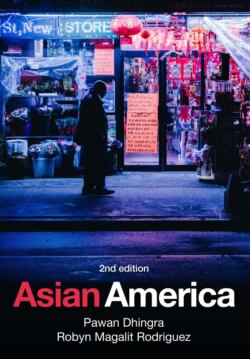Читать книгу Asian America - Pawan Dhingra - Страница 57
Racial profiling
ОглавлениеRacial profiling refers to the use of an individual’s assumed race or ethnicity in creating suspicion about the person otherwise not targeted by an official investigation. Racial profiling has been judged to be ineffective and actually detrimental to crime prevention (Wu 2002).6 Still, when national security is at stake, as it is when dealing with “foreign” threats that Asians and Asian Americans stereotypically pose, almost any tactic becomes permissible.
A high-profile case of racial profiling has been the mistaken accusations and imprisonment, including solitary confinement, of nuclear physicist Wen Ho Lee in 2000. He worked at the Los Alamos National Laboratory. He was accused of sharing secret information regarding nuclear weapons with Chinese authorities. His Taiwanese ethnic background figured in suspicions of him. According to Gotanda, “The spy charges have been maintained, not by evidence, but by constant allegations linking Wen Ho Lee to China. In its reliance upon innuendo rather than facts, the federal government has emphatically played its race card” (2000: 1690). An apology was issued to Lee by the judge for the grave misconduct in the case. Even The New York Times offered an apology to its readers for its poor coverage of the affair. As part of a plea bargain, Lee admitted guilt to one charge of mishandling sensitive information. Lee won a civil lawsuit against the government and certain media for their mishandling of his case.7 Such incidents pale in comparison, of course, to the gross internment of Japanese Americans during World War II, discussed in the next chapter, yet the threat of imprisonment by a feared Asian “enemy” continues.8
Some racial profiling is more racially and religiously based, again with the backdrop of Asian Americans as untrustworthy and possible threats. “Operation meth merchant” is the US Drug Enforcement Agency’s name given to its crackdown on Indian American-run convenience stores in northwest Georgia accused of selling common household items that, when mixed together, can help create methamphetamine (meth). While most stores in that area are white-owned, those targeted were run by Indian immigrants, often with limited English skills.9 Deportations resulted from this operation.
More wide-ranging government profiling of South Asian and Arab Americans has risen since 9/11 from its already high rate, with particular emphasis on men from predominantly Muslim countries.10 Under the “special registration program,” male residents in the United States who immigrated from one of twenty-five nations, practically all of which were Middle East and South Asian countries (including Bangladesh and Pakistan), were asked to register with the federal government. A portion of those who did were subsequently deported for having an undocumented status. If one did not report for registration, one could be “charged with ‘willful failure to register’, damaging their ability to obtain immigration benefits for which they were otherwise eligible” (SAALT congressional testimony, June 2010, p. 13).11 Deportation increased significantly among South Asian and Arab American populations. As quoted in congressional testimony in June 2010, “In fact, in the weeks immediately after 9/11, South Asians, Muslims, and Arabs were apprehended and detained by the FBI and held without charge; eventually, most were deported for minor immigration violations rather than any terrorism-related offenses.”12 Arab Americans and South Asian Americans, in particular Sikhs, were detained at airports for questioning by security officers without having committed any suspicious activity, based on the color of their skin, their religion, or their dress. Detentions have risen markedly since 9/11 for offenses not tied to terrorism (Shiekh 2011). This is another example of how international relations between the United States and Asian and Middle Eastern countries, often involving US imperial ambitions to shape the outcomes of these nations’ political and economic decisions, shape government treatment of US immigrants. In an act of pan-ethnic solidarity, following 9/11, the Japanese American Citizens League came out against the racial profiling of Arab and South Asian Americans.13
